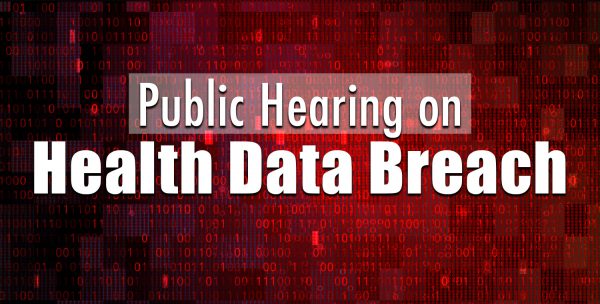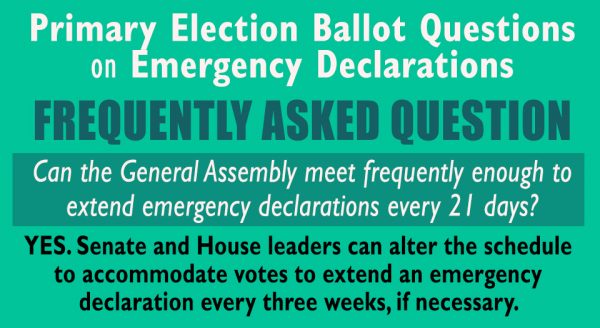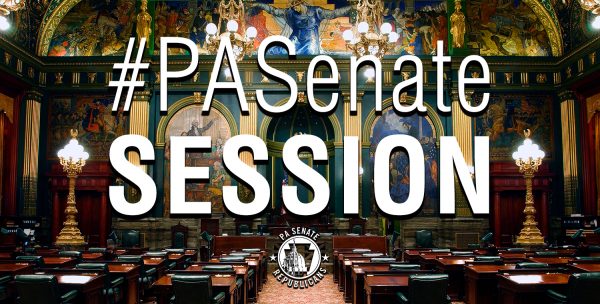
|
||
|
Week of May 10, 2021 In this Update:
Mask Mandate Changes Raise Questions and Concerns
Yesterday I penned an Op-Ed that I shared with all of you in response to the CDC indicating that fully vaccinated people no longer need to wear a mask or social distance. I have called on the Governor several times to lift his mask mandate, and as I was distributing my Op-Ed, the Department of Health issued a press release announcing that Pennsylvania’s mask mandate would align with the CDC’s new guidance. Unfortunately, under the revised mask mandate, fully vaccinated people are free to go without a mask, while unvaccinated people are still required to wear one until the Governor’s arbitrary vaccination mandate of 70% is achieved. This newest development creates two classes of people and promotes segregation based on health choices that are no one else’s business but the person who makes them. I cannot answer your questions about how this will be enforced because quite frankly, in my eyes it is unenforceable. What I can do is ask you all to be respectful of your fellow humans – those who choose to wear a mask, or not, and those who choose to get vaccinated, or not. We all want to “return to normal,” and it would behoove us to do so respectfully. Senate Approves Plan to Offer Additional Year of Education Due to COVID-19
Parents would have the option to allow their children to repeat a grade level due to the learning disruptions created by COVID-19 under a bill approved by the Senate this week. In current practice, the decision on whether to hold a student back is made solely by the child’s school and teachers. Senate Bill 664 would give parents the option to make that decision for the 2021-22 school year since they are in the best position to gauge their child’s development and educational needs after students have spent much of the past year learning at home. It would also allow parents to extend enrollment in special education programs for an extra year, preventing students with special needs from aging out of the system at age 21. Senate Acts to Preserve Prescription Drug Assistance for Seniors
The Senate adopted a plan that will allow thousands of older Pennsylvanians to retain eligibility for prescription drug assistance. PACE and PACENET are the state’s prescription drug assistance programs that provide life-sustaining medications to 257,000 seniors. Eligibility for the programs are based on income. The Social Security cost-of-living adjustment (COLA) for 2021 is estimated to result in almost 5,100 PACE and PACENET cardholders exceeding the income eligibility limits, meaning those seniors will lose their benefits. Senate Bill 323 extends the current moratorium on increases in income due to a Social Security COLA for PACE and PACENET enrollees for two additional years until Dec. 31, 2023, benefitting 17,800 seniors. Measure to Boost Donations for Breast Cancer Research Passed by Senate
The Senate approved legislation that would allow individuals renewing vehicle registrations or driver’s licenses to include an optional $5 donation to the Pennsylvania Breast Cancer Coalition. An estimated 2,000 women in Pennsylvania and 42,170 women nationwide will die from breast cancer this year, and one in eight women in the United States will develop breast cancer in her lifetime. The Pennsylvania Breast Cancer Coalition has been leading the fight against breast cancer since 1993. Throughout the years, PBCC has spent more than 1,500 hours on patient advocacy and contributed more than $4.5 million to breast cancer researchers in Pennsylvania. No Answers from Administration on Data Breach Affecting 72,000
The Senate Communications and Technology Committee convened a public hearing Tuesday to seek answers about a massive data breach of personal health data impacting more than 72,000 Pennsylvanians. After initially agreeing to testify, Department of Health public officials said they would not testify nor answer questions from members. The committee also invited the third-party vendor that was awarded the $22.9 million state contract for COVID-19 contact tracing, but the company did not participate. The committee conducted the hearing to read questions into the record and announced it will evaluate all legal options to get answers for impacted citizens. Bitcoin & Blockchain Informational Presentation
On Tuesday, Senator John DiSanto, Chairman of the Senate Banking and Insurance Committee, hosted an informational presentation on the topic of what is called cryptocurrency. One of the most common forms is Bitcoin, which uses blockchain technology. The presentation was given by Peter Van Valkenburgh, Director of Research at the Coin Center, a non-profit research and advocacy group. Click here to watch the discussion and learn more about this emerging technology and form of currency. Tuesday, May 18th: Emergency Declaration Questions on the Primary Election Ballot
As I’ve reported to you in previous updates, the May 18 primary election features two proposed constitutional amendments to improve Pennsylvania’s emergency declaration process. There has been a great deal of confusion about what the amendments would accomplish. Here are some answers to frequently asked questions: Will voting YES on the amendments immediately end the current emergency declaration? No. Voting YES would only give lawmakers the opportunity to collaborate with the Executive Branch to avoid many of the negative consequences we have seen as a result of Governor Wolf’s unilateral actions. Is the General Assembly able to meet quickly enough to respond to emergencies? Absolutely. The PA General Assembly proved its ability to move quickly after the governor’s COVID-19 shutdown orders, becoming the nation’s first legislature to meet virtually. Lawmakers quickly delayed the primary election, authorized small business assistance, enacted local government emergency provisions, removed school mandates and ensured healthcare workers had PPE. Can the General Assembly meet frequently enough to extend emergency declarations every 21 days? Yes. Senate and House leaders can alter the schedule to accommodate votes to extend an emergency declaration every three weeks, if necessary. Would the state risk losing federal money for food assistance and other emergency funding if the amendments are approved? No. Legislative leaders intend to work with the governor cooperatively and in the best interests of the people of Pennsylvania to preserve access to federal emergency relief funding, while protecting lives and livelihoods. Will these amendments apply only to the current governor? No. This would apply to all future governors, Republicans and Democrats. You can find more information, including ballot wording and opinions from around the state, here. Up Next
On Thursday, May 20th at 11am, the Senate Aging and Youth Committee will hold a public hearing on the current status and needs of long-term care facilities one year after COVID-19. It will be livestreamed here. The Senate will reconvene on Monday, May 24th at 1pm. You can watch session live here. |
||
|
||

2024 © Senate of Pennsylvania | https://senatorregan.com | Privacy Policy |







